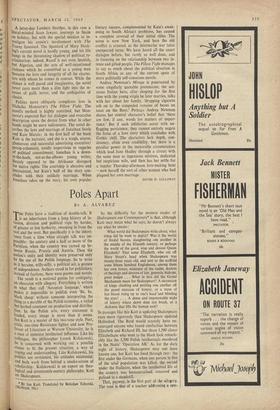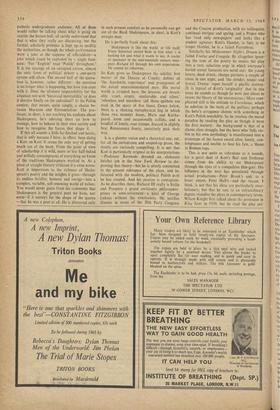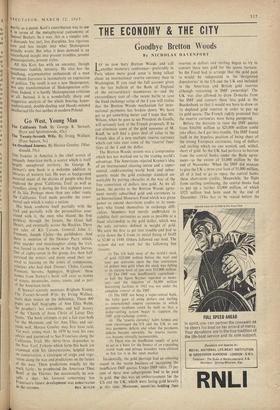Poles Apart
•
By A. ALVAREZ THE Poles have a tradition of double-talk. It is an inheritance from a long history of in- vasion, division and political rape by hordes, Of greater or less barbarity, sweeping in from the east and the west. But specifically it is the inheri- tance from a time when straight talk was im- Possible : the century and a half or 'more of the Partition, when the country was carved up be- tween Russia, Prussia and Austria. Then the nation's unity and identity were preserved only !Ilr the use of the Polish language. So to write In it became, willy-nilly, a political act, a gesture
independence. Authors stood in for politicians; Instead of factions, there were poems and novels.
The result is a national genius for ambiguity, an obsession with allegory. Everything is written In what they call `Aesopian language,' which makes it impossible to publish even `Ba, ba, black sheep' without someone interpreting the thing as a parable of the Polish economy, a veiled but barbed comment on production and distribu- tion. In the Polish arts, every statement is loaded, every image is more than it seems. Jan Kott is a master of this two-tone style. Poet, critic, one-time Resistance fighter and now Pro- fessor of Literature at Warsaw University, he is a man of immense intellectual influence. Like his colleague, the philosopher Leszek Kolakowski, he is concerned with working out a possible stance to fit the present situation, a way of coping and understanding. Like Kolakowski, his Politics are revisionist, his attitudes existential; and both work from behind a smoke-screen of Scholarship: Kolakowski is an expert on theo- IngIcal and seventeenth-century philosophy, Kott en Shakespeare.
*BY Jan Kott. Translated by Boleslaw Taborski. (Methuen, 30s.) So the difficulty for the western reader of Shakespeare our Contetnporary* is that, although Kott may mean what he says, he doesn't always say what he means: What world did Shakespeare write about, what time did he want to depict? Was it the world of feudal barons, slaughtering one another in the middle of the fifteenth century, or perhaps the world of the good, wise and devout Queen Elizabeth? That same Elizabeth, who cut off Mary Stuart's head when Shakespeare was twenty-three years old, and sent to the scaffold some fifteen hundred Englishmen, among them her own lovers, ministers of the realm, doctors of theology and doctors of law, generals, bishops, great judges . . . What in fact did the Grand Mechanism mean for Shakespeare? A succession of kings climbing and pushing one another off the grand staircase of history, or a wave of hot blood rising up to one's head land blinding the eyes? . . . A dense and impenetrable night of history where dawn does not break, or a darkness that fills the human soul?
In passages like this Kott is updating Shakespeare even more rigorously than Shakespeare updated Holinshed. The Bard would scarcely have en- couraged anyone who found similarities between Elizabeth and Richard III, but those 1,500 clever Elizabethans who went to the block look remark- ably like the 3,500 Polish intellectuals murdered in the Nazis' Operation AB.' As for the dark night of history, Shakespeare may not have known one, but Kott has lived through two: the first under the Germans, when one person in five of the total population was killed; the second under the Stalinists, when the intellectual life of the country was bureaucratised, censored and policed to a standstill. That, anyway, is the first part of the allegory. The tone is that of a teacher add' essing a sym-
pathetic undergraduate audience. AU of them would rather be talking about what is going on outside the lecture hall; all tacitly understand that that is what they really are discussing; but the formal, scholarly pretence is kept up to mollify -the authorities, as though the whole performance were a joke at the expense of officialdom—a joke which could be exploded by a 'single foot- note: 'For "English" read "Polish" throughout.' It is the strategy of an occupied nation, almost the only form of political debate a one-party system will allow. The second half of the quota- tion is, however, rather different: the question is no longer what is happening, but how you cope with it. Does the ultimate responsibility for the situation rest with 'historical inevitability' or does it devolve finally on the individual? In the Polish context, that means, quite simply, a choice be- tween Marxism and Existentialism. The pro- fessor, in short, is not teaching his students about Shakespeare, he's advising them on how to manage, how to behave in their own society and how to recognise the forces that shape it.
If this all sounds a little far-fetched and hectic, that is only because I have, in effect, been doing a Kott on Kott. It seems the only way of getting much out of the book. From the point of view of scholarship it is wild, more or less half-baked and wilfully contemptuous of everything we know of the traditions Shakespeare worked in. As a piece of straight literary criticism it is even worse. Kott is impervious to the richness of Shake- speare's poetry and the insights it gives—through its endless fertility, humour and energy—into a complex, variable, self-renewing world of values. You would never guess from his comments that Shakespeare is the greatest poet we have, nor even—if it weren't for the shape of the quotes —that he was a poet at all. He is iriterested only in such present comfort as he personally can get out of the Bard. Shakespeare, in short, is Kott's straight man.
He is perfectly frank about this:
Shakespeare is like the world, or life itself. Every historical period finds in him what it is looking for and what it wants to see. A reader or spectator in the mid-twentieth century inter- prets Richard III through his own experiences. He cannot do otherwise.
So Kott gives us Shakespeare the nihilist, first master of the Theatre of Cruelty, definer of 'the Auschwitz experience' and protagonist of the naked unaccommodated man. His moral world is stripped bare, the heavens are invari- ably 'cruel, empty, unalterable and silent,' 'relentless and merciless' (all those epithets are used in the space of five lines). Down below, there is a choking metaphysical fog in which those two monster buses, Marx and Kierke- gaard, loom and occasionally collide, and a handful of lonely, sour tramps, dressed in slightly beat Renaissance finery, tentatively pick their way.
It is a gloomy vision and a rhetorical one; yet, for all the melodrama and souped-up prose, the results are curiously compelling. It is not that Kott is particularly original in his interpretations —Professor Kermode devoted an elaborate hatchet job in the New York Review to dis- proving that theory—but he is utterly committed to the present relevance of the plays, and in- fatuated with the modern, political Polish pc et he has created. And his passion is contagious. As he describes them, Richard HI really is Stalin and Prospero a grand revisionist philosopher- prince in semi-retirement—a kind of George Lukacs without the evasiveness. He justifies Hamlet in terms of the 20th Party Congress
and the Cracow production, with no soliloquies, continual intrigue and spying, and a Prince who has 'read only newspapers' and looks like a student agitator; Kott's Hamlet, in fact, is no longer Hamlet, he is a failed Fortinbras.
Similarly, his Midsummer Night's Dream is a failed Troilus and Cteskida. By altogether ignor- ing the tone of the poetry he makes the play into a vast, salacious orgy in which everyone's buried sexual fantasies are acted out: the young lovers, dead drunk, change partners a couple of times in one night, and 'the slender, tender and lyrical Titania' rapes herself a phallic donkey. (It is typical of Kott's 'originality' that in this essay he sounds as though he were just about to invent the theory of the unconscious.) More com- plicated still is his attitude to Corio!anus, which he admires in the teeth of the politics; perhaps the hero's arrogance chimes with something in Kott's Polish sensibility. So he resolves the moral paradox by reading the play as though it were the first western : the background is that of a classic class struggle, but the hero who 'falls vic- tim to his own mythology' is transformed into a prototype of the fastest sword alive, lonely, con- temptuous and unable to beat his fate, a Shane in Roman toga.
This is not quite as ridiculous as it sounds, for a great deal of Kott's flair and freshness comes from his ability to see Shakespeare through the eyes of a compulsive film-goer. His influence in the west has percolated through actual productions—Peter Brook's and, to a lesser extent, Peter Hall's—and the reason, I think, is not that his ideas are particularly revo- lutionary, but that he can, to an extraordinary degree, visualise the plays in contemporary terms. Wilson Knight first talked about tit; grotesque in King Lear in 1930; but he read the play pri-
Marily as a poem. Kott's contribution was io See it In terms of the metaphysical pantomime of Samuel Beckett. In a way, this is a simpler job; it demands less tact, less discipline, less rigorous care and less insight into what Shakespeare actually wrote. But what it does demand is an exacerbated insight into present troubles, present Preoccupations, present styles.
All this Kott has with an uncanny, though sometimes faddish, intensity. He also has the headlong, argumentative enthusiasm of a man for whom literature is instinctively, an expression of Politics. The result is not a new Shakespeare, nOr any transformation of Shakespearian criti- cism. Indeed, it is hardly Shakespearian criticism at all. Instead, it is a wonderfully sharp and suggestive analysis of the whole bracing, hyper- sophisticated, double-dealing and bloody-minded intellectual life that seethes in modern Poland.




































 Previous page
Previous page